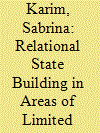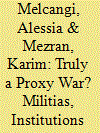|
|
|
Sort Order |
|
|
|
Items / Page
|
|
|
|
|
|
|
| Srl | Item |
| 1 |
ID:
108245


|
|
|
| 2 |
ID:
158455


|
|
|
|
|
| Summary/Abstract |
Limited statehood is frequently depicted as a major cause for civil war and violent conflict. Consequently, state-building efforts are often considered to be an effective tool for the prevention of civil war and violent conflict. This essay argues, however, that this assumption is misguided in several respects. First, at present and historically, areas of limited statehood are the global default rather than the exception. Thus, efforts to eliminate limited statehood would likely be unsuccessful. Second, limited statehood does not equal civil war and violence. In fact, only a small fraction of areas of limited statehood are affected by civil war. Third, a too-narrow focus on state-building may be counterproductive, as it may foster ineffective or even predatory state institutions. Such a focus also ignores the plurality of governance actors beyond the state that are relevant for effective governance–such as service provision and rule-making–in areas of limited statehood. Therefore, external actors like international organizations and foreign powers should contribute to governance-building rather than state-building, with a focus on service provision and rule-making institutions with a broader scope than the state.
|
|
|
|
|
|
|
|
|
|
|
|
|
|
|
|
| 3 |
ID:
172541


|
|
|
|
|
| Summary/Abstract |
Under what conditions does state expansion into limited statehood areas improve perceptions of state authority? Although previous work emphasizes identity or institutional sources of state legitimacy, I argue that relationships between state agents and citizens drive positive attitude formation, because these relationships provide information and facilitate social bonds. Moreover, when state agents and citizens share demographic characteristics, perceptional effects may improve. Finally, citizens finding procedural interactions between state agents and citizens unfair may adopt negative views about the state. I test these three propositions by randomizing household visits by male or female police officers in rural Liberia. These visits facilitated relationship building, leading to improved perceptions of police; shared demographic characteristics between police and citizens did not strengthen this effect. Perceptions of unfairness in the randomization led to negative opinions about police. The results imply that relationship building between state agents and citizens is an important part of state building.
|
|
|
|
|
|
|
|
|
|
|
|
|
|
|
|
| 4 |
ID:
174830


|
|
|
|
|
| Summary/Abstract |
Viewing the Salween River as a transboundary commons, this paper illustrates how diverse state and non‐state actors and institutions in hybrid and multi‐scaled networks have influenced water governance in general, and large dam decision‐making processes in particular. Putting power relations at the centre of this analysis and drawing on the conceptual lenses of hybrid governance and critical institutionalism, we show the complexity of the fragmented processes through which decisions have been arrived at, and their implications. In the context of highly asymmetrical power relations throughout the basin, and the absence of an intergovernmental agreement to date, we argue that hybrid networks of state and non‐state actors could be strategically engaged to connect parallel and fragmented decision‐making landscapes with a goal of inclusively institutionalising the transboundary commons and maintaining connected local commons throughout the basin, foregrounding a concern for ecological and social justice.
|
|
|
|
|
|
|
|
|
|
|
|
|
|
|
|
| 5 |
ID:
159363


|
|
|
|
|
| Summary/Abstract |
Post-interventionist security assistance is premised on non-normative security understandings and flexible arrangements between external and local actors. In hybrid political regimes or areas of limited statehood, these forms of assistance, while strengthening specific aspects of a country’s security context, reinforce some domestic actors vis-à-vis others thanks to processes of selective borrowing by local political elites. This paper demonstrates how such processes contribute to the proliferation of hybrid elements in the country’s security sector. In two contrasting case studies, we illustrate how security assistance packages in Lebanon and Tunisia have diluted emerging democratic reforms, producing more coercive manifestation of state power.
|
|
|
|
|
|
|
|
|
|
|
|
|
|
|
|
| 6 |
ID:
188173


|
|
|
|
|
| Summary/Abstract |
Analyses of the Libyan conflict from the 2011 revolt onward have tended to define it as a ‘proxy war’, especially because of the relevant role played by foreign actors and their intermingling with various local factions. However, this definition does not stand up to closer examination and definitely does not fit with the specifics of the Libyan case. Through a combined analysis of the three theoretical concepts of ‘areas of limited statehood’ (ALS), ‘rentier state’ and ‘proxy war’, after an examination of the role played by militias, economic institutions and external actors in the conflict, it is argued that the classic concept of proxy war does not fully apply to the war in Libya.
|
|
|
|
|
|
|
|
|
|
|
|
|
|
|
|
|
|
|
|
|